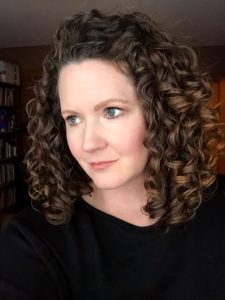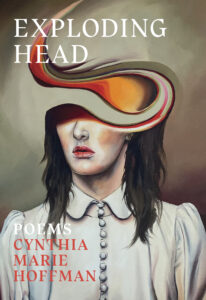WHAT IS THE CLOUDY HOUSE?
Though project books have a long history, they currently enjoy unprecedented popularity in the MFA thesis classroom and on the publication circuit. But what makes a book of poetry a project book, and what separates a successful project from an unsuccessful one? How does taking on a project affect a poet’s writing process, and what does the proliferation of project books in general signify for contemporary poetry? Poets Cynthia Marie Hoffman and Nick Lantz created the Cloudy House as a forum for answering these questions and exploring multiple perspectives on the project book phenomenon.
Read Cynthia Marie Hoffman’s essay on the pulse of project books in 2015 at AWP’s The Writer’s Notebook: “The Poetry Project Book: A Marriage of Heart and Mind.”
“I would build a cloudy House/ For my thoughts to live in.”
–Elizabeth Barrett Browning
![]() CONTACT US: contact@thecloudyhouse.com
CONTACT US: contact@thecloudyhouse.com
 CYNTHIA MARIE HOFFMAN is the author of four books of poetry, most recently Exploding Head (Persea Books, 2024), an OCD and anxiety memoir in prose poems; as well as Call Me When You Want to Talk about the Tombstones (Persea Books, 2018), which chronicles a mother and daughter’s genealogical quest to reconstruct their family history; Sightseer (winner of the 2010 Lexi Rudnitsky First Book Prize in Poetry), a travelogue that includes epistolary poems, and Paper Doll Fetus (Persea Books, 2014), CYNTHIA MARIE HOFFMAN is the author of four books of poetry, most recently Exploding Head (Persea Books, 2024), an OCD and anxiety memoir in prose poems; as well as Call Me When You Want to Talk about the Tombstones (Persea Books, 2018), which chronicles a mother and daughter’s genealogical quest to reconstruct their family history; Sightseer (winner of the 2010 Lexi Rudnitsky First Book Prize in Poetry), a travelogue that includes epistolary poems, and Paper Doll Fetus (Persea Books, 2014),  which explores the unborn baby as well as the doctors and midwives who treated and mistreated the birthing mother through history. She is also author of the chapbook Her Human Costume (Gold Line Press, 2014), a sequence of prose poems. Hoffman is a former Diane Middlebrook Poetry Fellow at the Wisconsin Institute for Creative Writing and Director’s Guest at the Civitella Ranieri Center in Italy. She has taught creative writing at George Mason University and the University of Wisconsin-Madison. Visit her online at www.cynthiamariehoffman.com. which explores the unborn baby as well as the doctors and midwives who treated and mistreated the birthing mother through history. She is also author of the chapbook Her Human Costume (Gold Line Press, 2014), a sequence of prose poems. Hoffman is a former Diane Middlebrook Poetry Fellow at the Wisconsin Institute for Creative Writing and Director’s Guest at the Civitella Ranieri Center in Italy. She has taught creative writing at George Mason University and the University of Wisconsin-Madison. Visit her online at www.cynthiamariehoffman.com.
|


